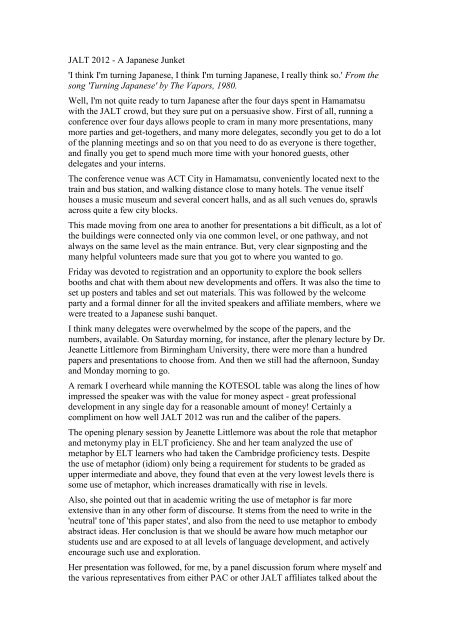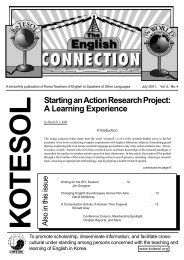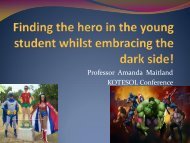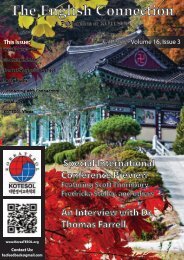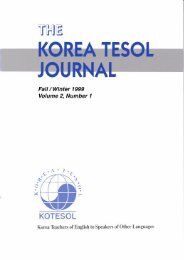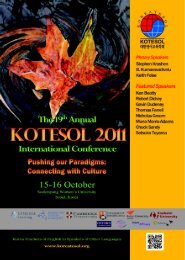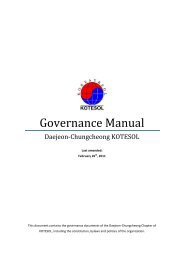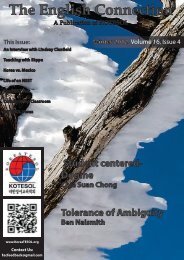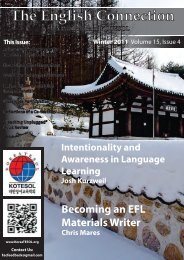JALT 2012 - A Japanese Junket 'I think I'm turning ... - Kotesol
JALT 2012 - A Japanese Junket 'I think I'm turning ... - Kotesol
JALT 2012 - A Japanese Junket 'I think I'm turning ... - Kotesol
You also want an ePaper? Increase the reach of your titles
YUMPU automatically turns print PDFs into web optimized ePapers that Google loves.
<strong>JALT</strong> <strong>2012</strong> - A <strong>Japanese</strong> <strong>Junket</strong><strong>'I</strong> <strong>think</strong> <strong>I'm</strong> <strong>turning</strong> <strong>Japanese</strong>, I <strong>think</strong> <strong>I'm</strong> <strong>turning</strong> <strong>Japanese</strong>, I really <strong>think</strong> so.' From thesong 'Turning <strong>Japanese</strong>' by The Vapors, 1980.Well, <strong>I'm</strong> not quite ready to turn <strong>Japanese</strong> after the four days spent in Hamamatsuwith the <strong>JALT</strong> crowd, but they sure put on a persuasive show. First of all, running aconference over four days allows people to cram in many more presentations, manymore parties and get-togethers, and many more delegates, secondly you get to do a lotof the planning meetings and so on that you need to do as everyone is there together,and finally you get to spend much more time with your honored guests, otherdelegates and your interns.The conference venue was ACT City in Hamamatsu, conveniently located next to thetrain and bus station, and walking distance close to many hotels. The venue itselfhouses a music museum and several concert halls, and as all such venues do, sprawlsacross quite a few city blocks.This made moving from one area to another for presentations a bit difficult, as a lot ofthe buildings were connected only via one common level, or one pathway, and notalways on the same level as the main entrance. But, very clear signposting and themany helpful volunteers made sure that you got to where you wanted to go.Friday was devoted to registration and an opportunity to explore the book sellersbooths and chat with them about new developments and offers. It was also the time toset up posters and tables and set out materials. This was followed by the welcomeparty and a formal dinner for all the invited speakers and affiliate members, where wewere treated to a <strong>Japanese</strong> sushi banquet.I <strong>think</strong> many delegates were overwhelmed by the scope of the papers, and thenumbers, available. On Saturday morning, for instance, after the plenary lecture by Dr.Jeanette Littlemore from Birmingham University, there were more than a hundredpapers and presentations to choose from. And then we still had the afternoon, Sundayand Monday morning to go.A remark I overheard while manning the KOTESOL table was along the lines of howimpressed the speaker was with the value for money aspect - great professionaldevelopment in any single day for a reasonable amount of money! Certainly acompliment on how well <strong>JALT</strong> <strong>2012</strong> was run and the caliber of the papers.The opening plenary session by Jeanette Littlemore was about the role that metaphorand metonymy play in ELT proficiency. She and her team analyzed the use ofmetaphor by ELT learners who had taken the Cambridge proficiency tests. Despitethe use of metaphor (idiom) only being a requirement for students to be graded asupper intermediate and above, they found that even at the very lowest levels there issome use of metaphor, which increases dramatically with rise in levels.Also, she pointed out that in academic writing the use of metaphor is far moreextensive than in any other form of discourse. It stems from the need to write in the'neutral' tone of 'this paper states', and also from the need to use metaphor to embodyabstract ideas. Her conclusion is that we should be aware how much metaphor ourstudents use and are exposed to at all levels of language development, and activelyencourage such use and exploration.Her presentation was followed, for me, by a panel discussion forum where myself andthe various representatives from either PAC or other <strong>JALT</strong> affiliates talked about the
differences we try to make in English education in Asia. In the hour and a halfavailable to us we each had a chance to talk about our outreach into the communitiesaround us and how we try to serve those communities.The panel discussion was followed by the PAC meeting, and after that I checked in onthe KOTESOL table, where a number of publications were displayed. People hadalready helped themselves to quite a few of the back issues of TEC, and some of theproceedings of our International Conferences.The people who stopped by and chatted were all complimentary about KOTESOL,and those who were planning on attending our Conference the following weekendused the opportunity to ask for advice about transport, accommodation and budget forthe weekend.I presented my paper on the ARC of Learning at 3.50 pm, after which I listened to apresentation about using Facebook for real communication by Jonathan Lynch, wherehe explained the use of FB to establish a spirit of community between a group of<strong>Japanese</strong> and Indonesian students prior to the students meeting face to face for a coralreef research project. His conclusion was that the use of English by both groups grewas they spent more time together, and Facebook facilitated this by providing anunmediated forum for them to explore the language through shared interests.After this it was time for the Best of <strong>JALT</strong>, a wonderful party where past presenterswere honored for their contribution, and this was followed by another dinner, thistime for the PAC and other affiliates, followed by some Karaoke! Suffice it to say agood time was had by all.Sunday saw yet another day of great presentations and a plenary of note, presented bySuresh Canagarajah of Pennsylvania State University. He spoke about how hisexperiences of being an English teacher in Sri Lanka and being badly evaluated by avisiting group of American academics, led him to seek academic validation bystudying in America, and how this ultimately led to the realization that people whowork on the periphery of any discipline are as valuable for their experience, theirpragmatic approach to the job they are doing, and the contribution they can makeabout what works, as those who work at the center and theorize.Since the displays and tables had to be packed up by Sunday 5pm, I audited thepresentations I'd attend and spent more time at the stand, interacting with many <strong>JALT</strong>members who were almost uniformly given to comment that they envy KOTESOL'sconference, and feel that theirs is but a poor comparison. Whether this was justfishing for compliments or not, it was still gratifying to hear. All the publications Itook along were snapped up, and some people even asked if I had a few more!Monday morning saw the 'tail-end' and again some really great presentations. Since Ihad no more commitments to man a table, I could check out quite a few, but the mostnotable were by Cervantes et al. 'Using Conversational Analysis for ProfessionalDevelopment', Sevigny et al. 'Vocabulary, What Should We Teach' and McGuire et al.'Online Discussion Forums: Practical Uses for EFL.'A final comment on one of the most interesting presentations, by Diane HawleyNagatomo in her paper <strong>'I</strong>t's a Man's World: Female Teachers in Japan', on the rolegender plays in the careers of Asian women. Many of the participants in the studyentered English language teaching because it was seen as womanly, a safe career, athing to 'fall back on' and very few of them expect to be 'full-time' at it. And this tiesin with the idea of the woman being the caregiver and housewife in Japan. It was
interesting that the audience listening to this presentation consisted of 19 women and4 men. To what extent that reflects 'preaching to the choir' I leave for you to judge.Leaving the conference to catch my flight back to Korea was an anticlimax. <strong>JALT</strong><strong>2012</strong> was a rich, and enriching experience, and I just wish I had the time to havecaught each and every paper presented, as <strong>I'm</strong> sure I missed some real gems. I want tothank KOTESOL for enabling my attendance, and <strong>JALT</strong> for supporting my visaapplication process and for the hospitality I received from them. It is deeplyappreciated.Author's BiographyLeonie Overbeek teaches at two middle schools inHwaseong City under the Hwaseong City Hall Englishsupport project. She has lived in South Korea since 2007,and hopes to stay even longer. Her interest is in classroominteractions, both with co-teachers as in team teaching,and with students. She has presented at severalKOTESOL conferences.


